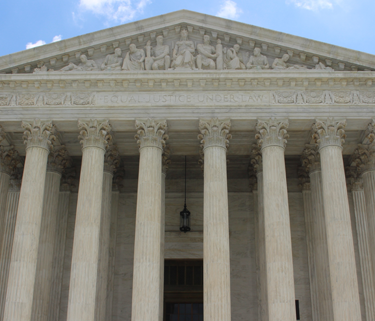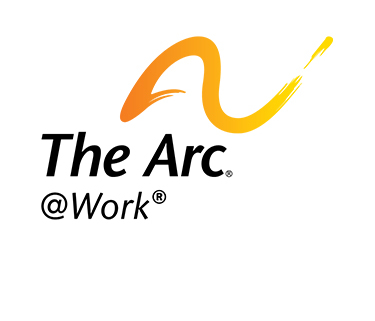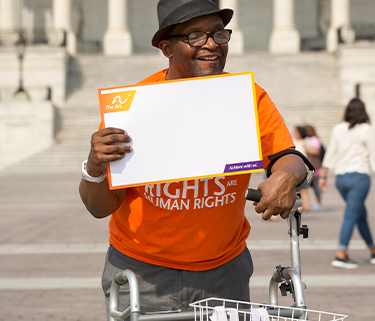The Arc Reviews Judge Amy Coney Barrett’s Record on Issues Impacting People With Disabilities: What Is at Stake
By Shira Wakschlag, Senior Director, Legal Advocacy & General Counsel
On September 26, President Donald Trump announced his nomination of Judge Amy Coney Barrett of the Seventh Circuit Court of Appeals for a seat on the U.S. Supreme Court following the passing of Justice Ruth Bader Ginsburg. Judge Barrett’s confirmation hearing before the Senate Judiciary Committee began today. The Arc is not taking a position on Judge Barrett’s nomination. As the confirmation process for this lifetime appointment unfolds, here we provide an overview of Judge Barrett’s disability and civil rights record to ensure our members and constituents in the disability community are fully informed about issues that impact people with disabilities.
Judge Barrett was nominated by President Trump to the Seventh Circuit Court of Appeals on May 8, 2017 and confirmed by the Senate on October 31, 2017. Prior to her appointment to the Seventh Circuit, she was a professor at Notre Dame Law School and a judicial clerk for Justice Antonin Scalia on the U.S. Supreme Court. Given her relatively short time on the bench, this overview includes sources such as law review articles and public speeches, in addition to key opinions from her judicial record.
Health Care
Background: The Arc has long fought for the rights of people with disabilities to have timely access to high quality, comprehensive, accessible, affordable health care that meets their individual needs, maximizes health, well-being and function, increases independence and community participation, and is aligned with principles of non-discrimination and equity. Through its public policy and legal advocacy work, The Arc has vigorously advocated for the Affordable Care Act (ACA) as essential for people with disabilities in providing affordable and necessary health care, Medicaid expansion, and protections for pre-existing conditions and against discrimination. The ACA also protects against lifetime coverage limits, guarantees coverage of services for mental health and developmental disabilities, and provides access to long-term home-based health care, allowing people with disabilities to live in the community, rather than institutions. The COVID-19 pandemic has only exacerbated healthcare disparities and underscored the critical importance of the ACA given the millions of newly unemployed Americans who would not otherwise be able to afford health insurance, the increase in disabilities and long-term healthcare needs resulting from COVID-19, and the possibility of discriminatory medical rationing prohibited by the ACA.
Judge Barret’s Record: Though Judge Barrett has not ruled in a case involving the ACA, she has been a vocal opponent of the law in a number of public forums. In a Notre Dame law review article discussing various approaches to judicial interpretation of statutes, Judge Barrett criticized the U.S. Supreme Court’s 2012 NFIB v. Sebelius decision upholding the ACA, writing that Chief Justice John Roberts had “pushed the Affordable Care Act beyond its plausible meaning to save the statute. He construed the penalty imposed on those without health insurance as a tax…had he treated the payment as the statute did—as a penalty—he would have had to invalidate the statute as lying beyond Congress’s commerce power.”
In 2015, in King v. Burwell,the U.S. Supreme Court again upheld the ACA, with Chief Justice Roberts writing the majority opinion and noting: “Congress passed the Affordable Care Act to improve health insurance markets, not to destroy them.” Justice Scalia dissented based on his interpretation of the law to prohibit subsidies in states with federal exchanges. Judge Barrett supported Justice Scalia’s interpretation in an interview on public radio. On November 10, the Court will hear oral arguments for California v. Texas, a case in which the constitutionality of the ACA has been challenged, threatening the law’s overall validity. Given Judge Barrett’s previous remarks on ACA-related cases and the shifting makeup of the court, the future of the ACA is under great threat, putting the health care of millions with disabilities in jeopardy.
Federal Disability and Civil Rights Laws
Background: The history of living with a disability in the U.S. has largely been one of discrimination, segregation, and exclusion from education, work, housing, and routine daily activities. Over its 70 year history, The Arc has been instrumental in the enactment of federal disability civil rights laws—including the Americans with Disabilities Act (ADA), Section 504 of the Rehabilitation Act, and the Individuals with Disabilities Education Act—which have helped society make great strides in protecting the civil rights of people with disabilities. The Arc has fought vigorously against a variety of attempts to narrow the scope of these protections. A robust interpretation and enforcement of federal disability and other civil rights laws is critical to ensuring the right of people with disabilities to live, work, learn, and play in the community, free from discrimination.
Judge Barrett’s Record: In 2019, Judge Barrett joined a decision out of the Seventh Circuit Court of Appeals upholding the state of Wisconsin’s open-enrollment program allowing public school students to apply to transfer from their resident school district to a nonresident district with available space. Plaintiffs—parents of students with disabilities who were denied transfers based on their special education needs—challenged the program as discriminatory. The program allows districts to distinguish between “regular education and special education spaces” and nonresident districts can deny a student’s transfer application if the district lacks the services or space necessary to meet their disability-related needs.
The court found for the state, holding that: “Differential treatment of special-needs students doesn’t make the program unlawful. Federal law ‘forbids discrimination based on stereotypes about a handicap, but it does not forbid decisions based on the actual attributes of the handicap.’ The program makes decisions based on the actual needs of disabled students, so it complies with federal law.” The ADA was enacted to provide a “clear and comprehensive national mandate for the elimination of discrimination against individuals with disabilities.” The court’s interpretation that the law is narrowly limited to protecting against “stereotypes” rather than discrimination based on the actual needs of people with disabilities is deeply concerning and inconsistent with the purpose of the statute.
More broadly, outside of the disability realm, Judge Barrett has consistently interpreted civil rights laws extremely narrowly to the detriment of marginalized groups, including people of color, older adults, and the LGBTQ+ community.[1]
Discrimination in Immigration Policy
Background: In 2018, the U.S. Department of Homeland Security announced the “public charge” rule which allows the federal government to deny admission into the U.S. based on the likelihood of an individual relying on public benefits for support. Through public policy and in the courts, The Arc has fought this rule because it discriminates against people with disabilities by allowing the government to deny admission into the U.S. based solely on a person’s disability and the use or expected use of public benefits like Medicaid. It also discourages immigrant families from utilizing critical public services—such as Medicaid, the Supplemental Nutrition Assistance Program, housing assistance, and other important programs—out of fear of harming their immigration status. Overall, the rule unfairly restructures immigration in a way that is detrimental to people based on their disability.
Judge Barrett’s Record: Earlier this year, in Cook County v. Wolf, the Seventh Circuit Court of Appeals upheld a preliminary injunction of the “public charge” rule, holding that it discriminates against people with disabilities by making it more difficult for immigrants with significant disabilities to come to the U.S. because of their increased likelihood of relying on government benefits for support: “The conclusion is inescapable that the Rule penalizes disabled persons in contravention of the Rehabilitation Act.” Judge Barrett dissented, writing that she would vacate the injunction based on her understanding that “DHS’s definition is a reasonable interpretation of the statutory term ‘public charge.’”[2]
[1] See, e.g. Equal Employment Opportunity Commission v. AutoZone (7th Cir. 2017) (denying petition for en banc rehearing of a case in which the lower court ruled for the employer where the EEOC claimed that AutoZone had an unlawful practice of segregating employees by race when it assigned Black employees to stores in Black neighborhoods, which the dissent criticized as an unlawful “separate-but-equal arrangement”); Kleber v. CareFusion Corporation (7th Cir. 2019) (joined majority opinion holding that the Age Discrimination in Employment Act protects only current employees from discrimination due to disparate impact, not outside job applicants. One dissenting judge criticized the opinion, noting: “Wearing blinders that prevent sensible interpretation of ambiguous statutory language, the majority adopts the improbable view that the Act outlawed employment practices with disparate impacts on older workers, but excluded from that protection everyone not already working for the employer in question.”); Amy Coney Barrett, Hesburgh Lecture, Jacksonville University Public Policy Institute, 2016, available at: https://www.youtube.com/watch?v=7yjTEdZ81lI (criticizing Obergefell v. Hodges (U.S. 2015)—Supreme Court decision establishing a constitutional protection for marriage equality for same sex couples—and noting that Title IX should not be interpreted to extend its protections to transgender people.). Judge Barrett also provided paid speeches in 2015 and 2016 to the Alliance Defending Freedom, an organization designated as a hate group by the Southern Poverty Law Center.
[2] For more information on Judge Barrett’s disability record, see The Bazelon Center, “Amy Coney Barrett’s Record on Issues Affecting People with Disabilities”
















